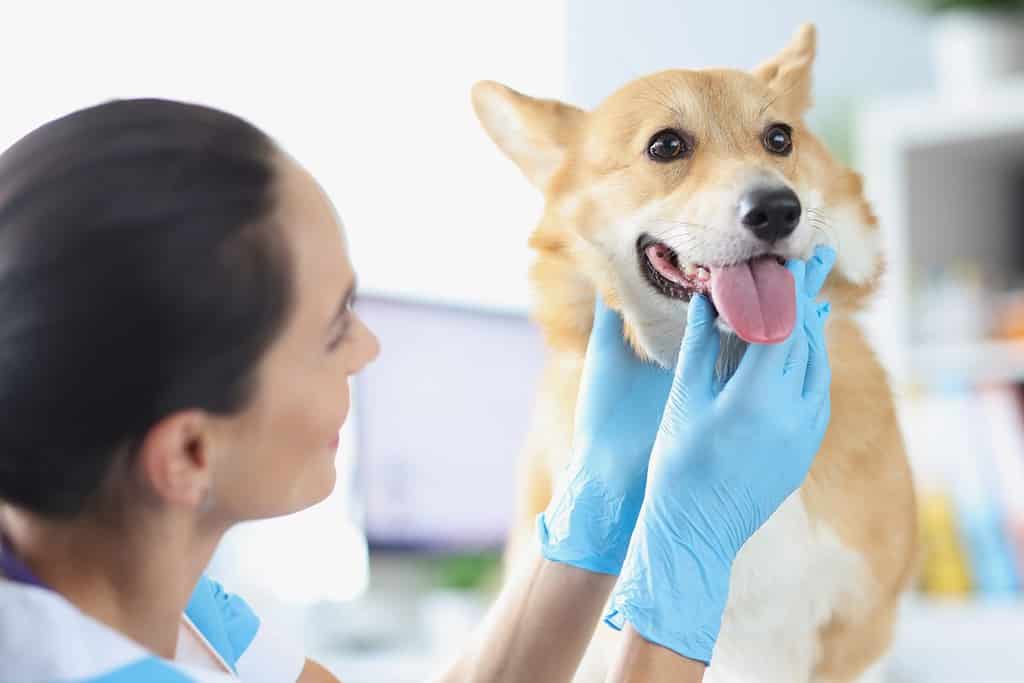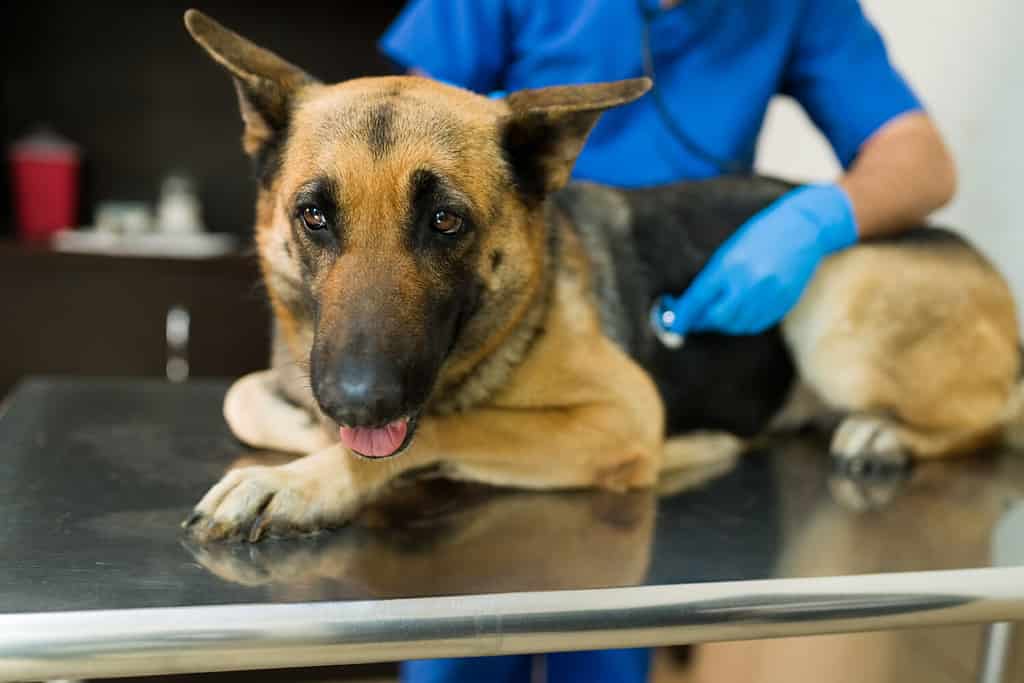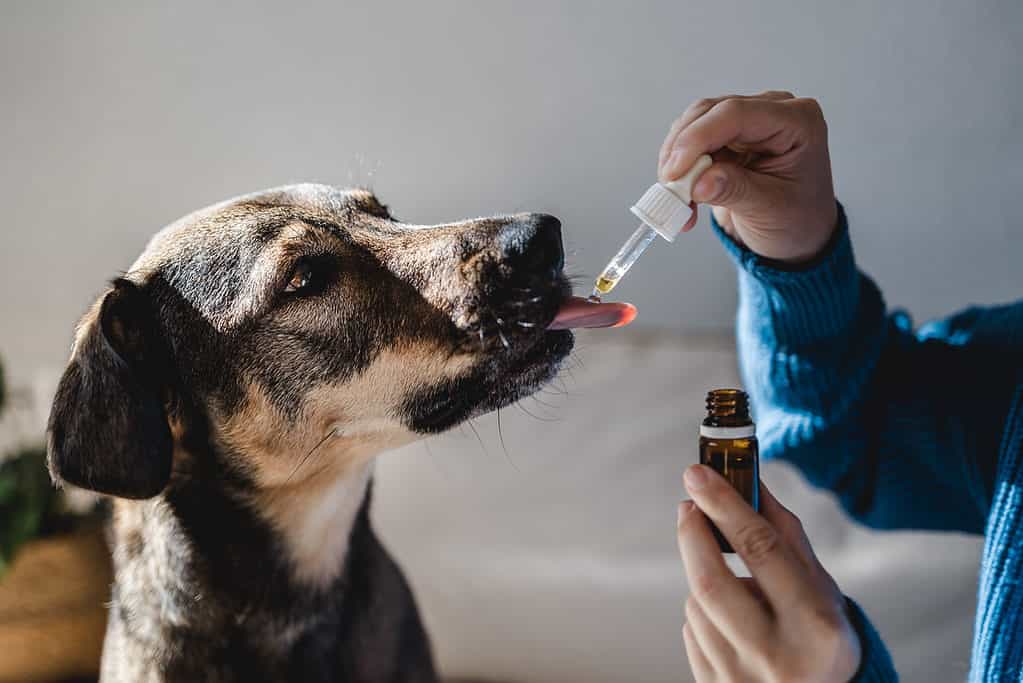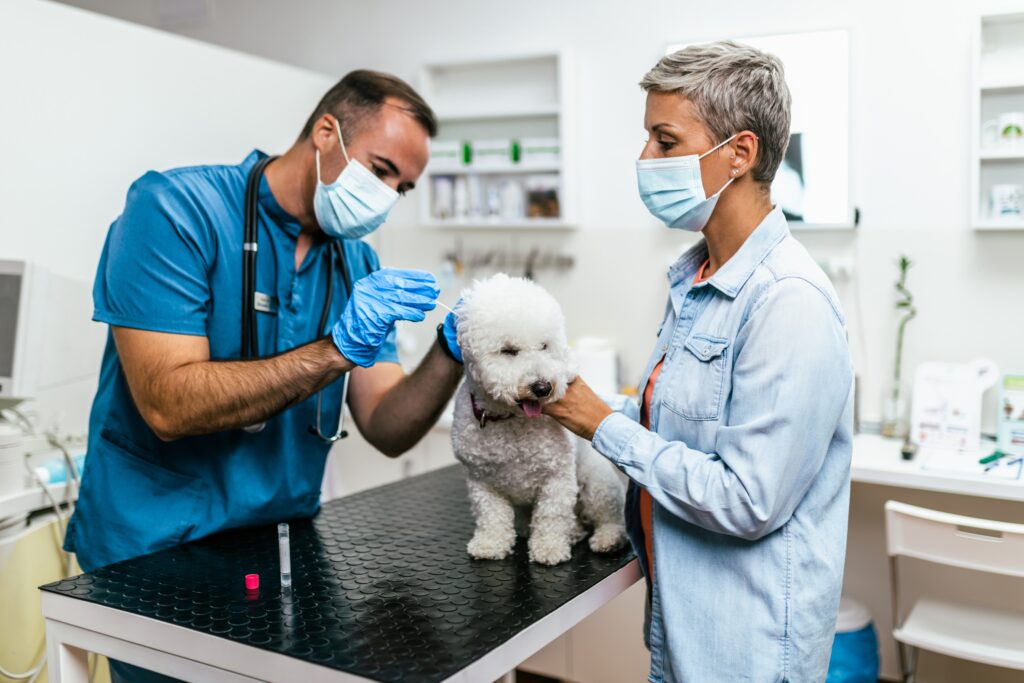It can be very stressful for both animals and owners when a pet falls ill. Thankfully, veterinary science has come incredibly far throughout the years, and animals are now living longer and happier lives than ever before. A major part of this is due to advancements in prescription medicine. Today, let’s discuss Vetprofen, review the proper dosage of this drug, and also explore the risks and side effects associated with its use.
When Do Dogs Need Vetprofen?

If you notice a sudden change in your dog’s behavior, discontinue the use of Vetprofen and contact your vet immediately.
©megaflopp/Shutterstock.com
Animal lovers know that when your pet doesn’t feel well, you don’t feel well. Luckily, many prescription drugs are available to treat various conditions that our furry friends experience and help them through these tough times. One of them is Vetprofen, which is a non-steroidal anti-inflammatory drug (NSAID). According to Vetoquinol USA, “Vetprofen is indicated for the relief of pain and inflammation associated with osteoarthritis and for the control of postoperative pain associated with soft tissue and orthopedic surgeries in dogs.”
Dogs who recently underwent surgery or older dogs who have developed osteoarthritis are candidates for this drug. However, not every dog that grapples with inflammation will be a good candidate for Vetprofen, but we’ll discuss this more in a bit. If you think your dog would benefit from the use of this pain relief drug, schedule an appointment and talk to your veterinarian to get a prescription.
Side Effects of Vetprofen on Dogs

Gastrointestinal issues such as vomiting, loss of appetite, diarrhea, bloating, and irregular bowel movements are all associated with NSAID use.
©SeventyFour/ via Getty Images
Although many dogs take Vetprofen and experience no complications at all, others are not as lucky. Because of this, it is important for owners to be aware of what can go wrong. Vetprofen is an NSAID, and there are several side effects linked to drugs of this type. Let’s review some of the most common.
- Weakness
- Lethargy
- Vomiting
- Appetite loss
- Diarrhea
- Bloating
- Gastrointestinal bleeding
- Irregular bowel movements
- Dark-colored, tarry stool
- Skin conditions
- Kidney issues
- Liver issues
- Pregnancy complications
While many of these side effects are most often mild if present at all, they can be very serious in certain cases. If your dog begins behaving in an abnormal way after administering Vetprofen, discontinue use immediately. If you observe any of these side effects become worse over time, contact your vet as soon as possible to schedule an appointment.
Signs of Vetprofen Overdose in Dogs

Always follow your veterinarian’s instructions when treating your pet for inflammation.
©maxbelchenko/Shutterstock.com
Signs of a Vetprofen overdose can look similar to the side effects we’ve just discussed. Black, tarry stools, vomiting, and diarrhea are some of the most common warning signs. Overconsumption of any NSAID can cause damage to the gastrointestinal tract and cause bleeding. Owners may also observe weakness and difficulty walking. In extreme cases, dogs may suffer seizures and muscle spasms as well. Vetprofen overdose can be deadly and must be treated quickly. If you have any concerns about your dog ingesting too much Vetprofen, bring them to an emergency vet as soon as possible.
Taking too much Vetprofen in one sitting can cause a myriad of issues, but prolonged use of this drug can also be responsible for complications. Be sure to follow your vet’s instructions carefully and never stray away from the dosage plan they create.
When is Vetprofen Not an Option For Your Dog?

If you find that your dog is experiencing a serious complication related to their use of this drug, seek veterinary help immediately. Some emergency vet clinics are open 24/7.
©Beach Creatives/Shutterstock.com
While some dogs benefit greatly from the use of this drug, other dogs are not good candidates for Vetprofen at all. According to the FDA, “Dogs and cats at greatest risk for developing side effects from NSAID therapy are those that are dehydrated, on concomitant diuretic therapy, have recently been treated with a corticosteroid, or have pre-existing kidney, heart, or liver dysfunction.” Animals who fall into any of the above categories should seek alternative methods of pain relief as their risk of developing medical complications is greatly increased.
In addition, any dogs who have reacted negatively to NSAID or carprofen use in the past should stay away from Vetprofen entirely. Dogs used for breeding should also avoid this medication entirely as it may cause complications during pregnancy. Vetprofen should only ever be administered to dogs. Other animals, such as cats, are not candidates for this prescription drug.
Vetprofen Dosage Chart

The weight of your dog will play a role in how many milligrams of Vetprofen they should ingest.
©Juice Flair/Shutterstock.com
Improper use of this drug can lead to serious side effects, and in certain cases, even death. Because of this, ensuring that your pet is taking the proper amount is paramount in protecting their health. Vetprofen comes in caplet form and should be taken orally. The recommended dosage is two milligrams per pound your dog weighs daily. Caplets come in three strengths, 25 mg, 75 mg, and 100 mg. These can be broken down to give your dog an accurate dosage for their weight.
| Dog’s Weight (Pounds) | Vetprofen Dosage | Dog Breeds |
|---|---|---|
| 0 – 5 | 0 to 10 milligrams | Chihuahua, Toy Poodle |
| 5 – 10 | 10 to 20 milligrams | Maltese, Havanese |
| 10 – 20 | 20 to 40 milligrams | Italian Greyhound, Miniature Schnauzer |
| 20 – 30 | 40 to 60 milligrams | Shiba Inu, Alaskan Klee Kai |
| 30 – 40 | 60 to 80 milligrams | Border Collie, Whippet |
| 40 – 50 | 80 to 100 milligrams | Pit Bull, Springer Spaniel |
| 50 – 60 | 100 to 120 milligrams | Chow Chow, Dalmatian |
| 60 – 70 | 120 to 140 milligrams | Catahoula Leopard Dog, Labrador Retriever |
| 70 – 80 | 140 to 160 milligrams | German Shepherd, Greyhound |
| 80 – 90 | 160 to 180 milligrams | Great Pyrenees, Doberman |
| 90 – 100+ | 180 to 200+ milligrams | Great Dane, Saint Bernard |
Only use this chart as a general guide for Vetprofen dosage. It is always best to follow the advice of a veterinarian who has evaluated your animal personally.
Alternatives to Vetprofen for Dogs

CBD products come in a variety of different forms, such as oils, caplets, and topical ointments.
©iStock.com/Vanessa Nunes
Some dogs are unable to take Vetprofen but still need medicine that will help them cope with inflammation and pain. Thankfully, there are alternatives to this drug. Other NSAIDs include deracoxib, firocoxib, rimadyl, and carprofen. However, some dogs will require alternatives to NSAIDs altogether. Some natural alternatives include CBD, turmeric, and omega-3 fatty acids. Be sure to research the proper dosage and schedule for these substitutes before giving them to your dog.
In addition, some veterinarians recommend physical therapy, acupuncture, and canine chiropractors to help relieve pain caused by inflammation. Some of these procedures may be covered by pet insurance, which is a wonderful safety net to have. As always, it’s important to connect with your vet to address your dog’s personal needs and formulate a plan that caters to them directly.
How to Treat Vetprofen Overdose in Dogs

Misuse of Vetprofen can cause your dog to become extremely ill.
©hedgehog94/Shutterstock.com
Caring for a dog who is experiencing a Vetprofen overdose can be frightening and stressful. If you believe your dog is overdosing, remain calm and bring them to a vet immediately. While some owners may think that at-home treatment is possible, your pet will have the best chance of recovery if treated by a licensed professional. While some cases of Vetprofen overdose are fatal, many are treatable. The most important determining factor is time. The quicker you bring your dog into the veterinarian, the better odds they’ll have of survival.
Final Thoughts
While Vetprofen is a wonderful drug that helps countless pets across the world, it’s important to know when and how to administer it correctly. Some pets benefit greatly from the pain relief it provides, while others are better off exploring alternative routes. As we stated above, the most important part of this process is consulting with a trained professional who can gauge your dog’s personal needs.
The photo featured at the top of this post is © SeventyFour/ via Getty Images
Ready to discover the top 10 cutest dog breeds in the entire world?
How about the fastest dogs, the largest dogs and those that are -- quite frankly -- just the kindest dogs on the planet? Each day, AZ Animals sends out lists just like this to our thousands of email subscribers. And the best part? It's FREE. Join today by entering your email below.
Thank you for reading! Have some feedback for us? Contact the AZ Animals editorial team.






